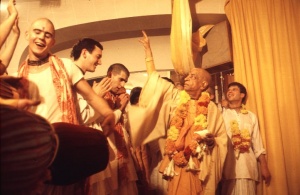SB 5.5.33

A.C. Bhaktivedanta Swami Prabhupada
TEXT 33
- tasya ha yaḥ purīṣa-surabhi-saugandhya-vāyus taṁ
- deśaṁ daśa-yojanaṁ samantāt surabhiṁ cakāra
SYNONYMS
tasya—His; ha—indeed; yaḥ—which; purīṣa—of the stool; surabhi—by the aroma; saugandhya—possessing a good fragrance; vāyuḥ—the air; tam—that; deśam—country; daśa—up to ten; yojanam—yojanas (one yojana equals eight miles); samantāt—all around; surabhim—aromatic; cakāra—made.
TRANSLATION
Because Lord Ṛṣabhadeva remained in that condition, the public did not disturb Him, but no bad aroma emanated from His stool and urine. Quite the contrary, His stool and urine were so aromatic that they filled eighty miles of the countryside with a pleasant fragrance.
PURPORT
From this we can certainly assume that Lord Ṛṣabhadeva was transcendentally blissful. His stool and urine were so completely different from material stool and urine that they were aromatic. Even in the material world, cow dung is accepted as purified and antiseptic. A person can keep stacks of cow dung in one place, and it will not create a bad odor to disturb anyone. We can take it for granted that in the spiritual world, stool and urine are also pleasantly scented. Indeed, the entire atmosphere became very pleasant due to Lord Ṛṣabhadeva's stool and urine.